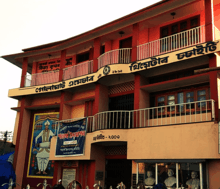Golaghat Amateur Theatre Society
Golaghat Amateur Theatre Society is a society for promoting performing arts, such as music, dance, and theatre; literature, such as poetry, novels and short stories; and visual arts, such as drawing, painting, photography, with more than 100 years of history representing Golaghat's and Assam's arts' industry. The society was formed at Golaghat in Assam to bring Assamese people closer to the world of performing and visual arts.
Golaghat Amateur Theatre Society | |
 Façade of GATS | |
| Abbreviation | GATS |
|---|---|
| Formation | 1895[1] |
| Headquarters | Dhodar Ali (Road) Golaghat |
Region served | Assam, primarily Golaghat |
Membership | Exec. Members - 24 Exec. Co-opted Members - 8 + Lifetime Members |
Official language | Assamese, English |
President | A. Baruah[2] |
Vice President | M. Roy[3] |
History
Established in the year 1895, the Golaghat Amateur Theatre Society (informally GATS), was formed by a group of philanthropists led by Late Joy Chandra Maitra and others who envisioned to develop a centre for uplifting the dramatic and cultural talents in the state of Assam, particularly in Golaghat area. The permanent theatre hall of the society, commonly known as “Amateur Theatre Hall”[4] is one of the oldest dramatic arts' buildings in the state of Assam and has been in existence for over 117 years. The society's heritage and significant contribution to the Assamese culture in the field of arts, was recognised by the Government of India, and it was awarded funds for its development under India's former Prime Minister – Manmohan Singh's vision book.[5][6]
Structure
The Society conducts a series of cultural events throughout the year, including experimental theatres[7] executed as per the mechanism adopted by its Managing Committee. The society has an executive body consisting of 32 members, besides lifetime members.
Present
The society has been organising “All Assam One Act Drama Competition” in the memory of distinguished dramatist Late Surendra Nath Saikia since 1981 encouraging participation from the citizens of different parts of the state in dramatic and cultural activities.[8] In addition to the experimental theatres, the society also actively participates in recognising talents from various walks of life, such as poets and littérateurs of Assamese literature.[9][10]
References
- "Quit India Movement In Assam, Quit India and Student and Woman Movements in Golaghat District, page 6". Anil Kumar Sharma. 2007.
- "Members of Executive Body members, GATS". 2014.
- "Members of Executive Body members, GATS". 2014.
- "Golaghat District Journalist Association's golden jubilee celebrations underway, The Eastern Today". ET Correspondent. 27 November 2015.
- "Ideas is what he likes to talk about, Rediff.com (News)". The Rediff Special. 20 May 2004.
- Manmohan Singh: Visionary to Certainty – Ideas is what he likes to talk about, page 77. K. Bhushan, G. Katyal. 2004.
- "Golaghat to witness new theatre, The Telegraph - Calcutta - Gauhati". Ritupallab Saikia. 19 June 2014. Retrieved 20 June 2014.
- "A brief introduction, GATS".
- "Book Quest, Volume I, Issue II - Awards and Honours" (PDF). Book Quest. 9 March 2014.
- "Golaghat Ratna Award conferred, The Assam Tribune". Correspondent. 20 September 2016. Retrieved 21 September 2016.